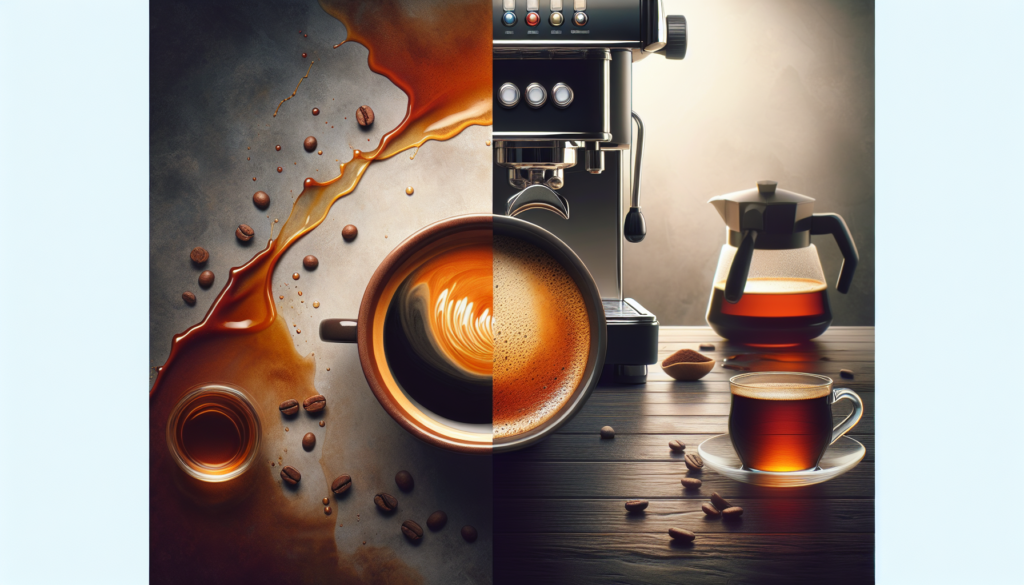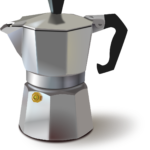So, you fancy yourself a coffee connoisseur, do you? Well, let me ask you this: is watered down espresso really the same thing as a good ol’ cup of coffee? It’s a question that has sparked many a heated debate among caffeine enthusiasts. Some argue that the intense flavor of espresso simply can’t be replicated by diluting it with hot water, while others claim that the end result is indistinguishable from your regular cup of joe. So, grab a seat, my friend, and let’s take a closer look at this age-old question. Many coffee enthusiasts have debated this question, wondering if diluting espresso with water would result in the same beverage as regular brewed coffee. To truly understand the answer, it is important to delve into the definitions and origins of espresso and coffee, explore their brewing processes, and examine their unique characteristics. Additionally, we will discuss what exactly watered down espresso is, the effect of dilution on espresso flavor, and how it compares to the flavor of regular coffee. Finally, we will touch on some health considerations related to these two beloved caffeinated drinks.
Definition and Origins of Espresso
Espresso, a concentrated form of coffee, originated in Italy in the early 20th century. It is a unique brewing method that involves forcing hot water through finely ground coffee beans under high pressure. The result is a small serving of highly concentrated coffee that is typically served as a shot. The intense flavors and aromas of espresso have made it a beloved beverage all around the world.
The Brewing Process of Espresso
The brewing process of espresso is a meticulous and time-sensitive task. First, finely ground coffee beans are measured and carefully tamped into a portafilter. The portafilter is then locked into an espresso machine, and hot water is forced through the coffee grounds at a pressure of around nine bars. This process extracts the flavors and oils from the coffee quickly and efficiently, resulting in a rich and concentrated brew that is the base for various espresso-based drinks like lattes, cappuccinos, and Americanos.

Characteristics of Espresso
Espresso is known for its distinctive characteristics. It has a full-bodied and strong flavor, often described as bold, robust, and intense. The concentrated nature of espresso allows the subtle flavors of the coffee beans to shine through, with notes of chocolate, caramel, fruit, or even floral undertones. Additionally, espresso exhibits a beautiful crema, a layer of foam that forms on top of the shot, offering a rich and silky mouthfeel.
Definition and Origins of Coffee
In contrast to espresso, coffee refers to the beverage derived from brewing roasted coffee beans with hot water. The origins of coffee can be traced back to the 15th century in the regions of Ethiopia and Yemen. From there, it spread across the world, becoming one of the most popular drinks globally. Coffee comes in various forms and brewing methods, such as drip brewing, French press, pour-over, and more.

The Brewing Process of Coffee
The brewing process of regular coffee involves steeping coarsely ground coffee beans in hot water for a specific amount of time. The water extracts the coffee’s flavors and compounds, resulting in a flavorful and aromatic beverage. This process allows for a more extended contact time between the water and coffee grounds compared to the quick and high-pressure extraction of espresso. The brewed coffee is then strained, and the liquid is collected for consumption.
Characteristics of Coffee
Coffee possesses its own set of characteristics that differentiate it from espresso. Regular brewed coffee typically has a milder and less concentrated flavor profile compared to espresso. It often exhibits a pleasant acidity and a wide range of flavors based on the coffee beans used and the brewing method employed. Coffee can be enjoyed black or with the addition of milk, cream, sugar, or other flavorings to suit individual preferences.
What is Watered Down Espresso?
Watered down espresso, as the name suggests, refers to the dilution of espresso with additional water. This dilution is often done to reduce the intensity of espresso and create a beverage more reminiscent of regular brewed coffee. The amount of water added can vary depending on personal taste preferences. Some individuals may prefer a 1:1 ratio of espresso to water, resulting in a milder version of espresso, while others may dilute it further to achieve a taste similar to traditional coffee.
Effect of Dilution on Espresso Flavor
When espresso is diluted with water, it inevitably affects the overall flavor profile. The intense and concentrated flavors of the espresso become milder and less pronounced. This dilution may result in a smoother and less acidic drink, which some individuals find more enjoyable. However, it is crucial to note that diluting espresso does not entirely replicate the flavors of regular brewed coffee, as they are still distinct beverages with unique brewing methods and characteristics.
Comparison of Watered Down Espresso and Coffee Flavor
While watered down espresso may share similarities with regular coffee in terms of a milder taste, it is essential to acknowledge their inherent differences. Coffee brewed using traditional methods has a more developed and nuanced flavor profile, with a wider range of flavors and complexities. The brewing process of coffee allows for a more extended extraction time and the extraction of different compounds, resulting in a more diverse taste experience compared to watered down espresso. Nonetheless, both options have their own charm and are enjoyed by coffee lovers worldwide.
Health Considerations
When it comes to health considerations, both watered down espresso and regular coffee have their advantages and potential drawbacks. These caffeinated beverages can provide a much-needed energy boost and contain certain beneficial compounds such as antioxidants. However, it is essential to consume them in moderation and be mindful of any potential negative effects, such as increased heart rate or disrupted sleep patterns, especially for individuals who are sensitive to caffeine. Each person’s tolerance to caffeine varies, so it is crucial to listen to your body and make informed choices.
In conclusion, while watered down espresso may offer a milder taste similar to regular brewed coffee, it is important to recognize that they are distinct beverages with their own brewing processes and characteristics. Espresso is known for its concentrated and intense flavors, while regular coffee offers a wider range of flavors and complexities. Both options have their own merits and can be enjoyed depending on personal preferences and occasions. So next time you’re craving a cup of coffee, whether it’s a shot of espresso or a brewed cup, consider the unique qualities of each and savor the experience.






